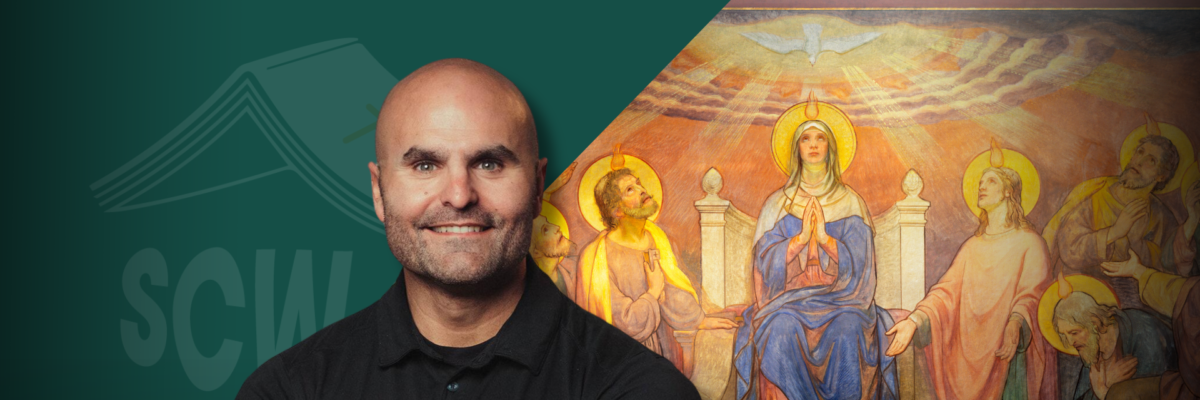
Episode 133: Pentecost Sunday, Year C
The readings for this upcoming Pentecost Sunday, Year C provide us with several details that are relevant for doing apologetics. The first reading, which is the reading for Pentecost each year is Acts 2:1-11—the narrative of the Jewish feast of Pentecost when the Holy Spirit descended upon the disciples and empowered them to witness to Christ, provides us with material that relates to the nature of the gift of tongues, Peter’s leadership in the early church, and the topic of Sacred Tradition. Given that we’ve exhausted what we can be said about the second reading, taken from 1 Corinthians 12:3b-7, 12-13, we’re going to focus on the optional second reading, taken from Romans 8:8-17. The related apologetic topic is the doctrine common among some Protestants that we can have an absolute assurance that we will be finally saved. Finally, the optional Gospel reading, taken from John 14:15-16, 23b-26, provides us material that relates to the topic of inspiration, which in turn ties into discussions surrounding Sola Scriptura.
Readings: Click Here
Looking for Sunday Catholic Word Merchandise? Look no further! Click Here
Hey everyone,
Welcome to The Sunday Catholic Word, a podcast where we reflect on the upcoming Sunday Mass readings and pick out the details that are relevant for explaining and defending our Catholic faith.
I’m Dr. Karlo Broussard, staff apologist and speaker for Catholic Answers, and the host for this podcast.
The readings for this upcoming Pentecost Sunday, Year C provide us with several details that are relevant for doing apologetics. The first reading, which is the reading for Pentecost each year is Acts 2:1-11—the narrative of the Jewish feast of Pentecost when the Holy Spirit descended upon the disciples and empowered them to witness to Christ, provides us with material that relates to the nature of the gift of tongues, Peter’s leadership in the early church, and the topic of Sacred Tradition. Given that we’ve exhausted what we can be said about the second reading, taken from 1 Corinthians 12:3b-7, 12-13, we’re going to focus on the optional second reading, taken from Romans 8:8-17. The related apologetic topic is the doctrine common among some Protestants that we can have an absolute assurance that we will be finally saved. Finally, the optional Gospel reading, taken from John 14:15-16, 23b-26, provides us material that relates to the topic of inspiration, which in turn ties into discussions surrounding Sola Scriptura.
So, let’s start with the first reading from Acts 2. I’m not going to read the whole text. Rather, I will only highlight the details that are relevant for our purposes.
The first detail is Luke’s reference to the gift of “tongues” that was given to the disciples. As I pointed out in episode 27, Pentecost Sunday, Year A, this has given rise to great controversy among Christians, both within and without the Catholic Church. The question is, “What is the nature of such a gift?”
I have a bit to say in response to this question in that same episode. However, there is a bit more to say here.
As we’ve said before, for some Christians the gift of “tongues” refers to a “private prayer language” inspired by the Holy Spirit that objectively speaking is merely a collection of unintelligible speech sounds. And to defend this view, some appeal to this event at Pentecost, especially the response of some in the crowd: “They are filled with new wine” (v.12), the implication being, as Peter notes in verse 15, they were thought to be drunk.
When the apostles started speaking in “other tongues” (v.4), some in the crowd were amazed but others thought they were drunk. The challenge by some charismatics is that if these “tongues” were a real language, like many Christians assert (including myself and many of us here at Catholic Answers), then why would those in the crowd think they were drunk? For example, if you hear me speaking a language that you understand, you wouldn’t think I was drunk. But if you heard me speaking unintelligible speech sounds, you’d think I was drunk.
Since some in the crowd thought the disciples were drunk, so it’s argued, it follows that what they heard were not real languages but the unintelligible speech sounds that are commonly thought to be the gift of tongues in Charismatic circles.
The first thing to say in response is that this line of interpretation assumes that the “unintelligible speech sound” view of the gift of tongues is the only reasonable explanation for why some of the crowds thought the disciples were drunk. But this is not true.
First, the crowd’s response can just as easily be explained by the “real language” view.
Consider, for example, that most of the Jews present there would have only understood the disciples speaking in only their own language or maybe perhaps two languages. This means the rest of the languages spoken (which was several according to Luke in Acts 2:9-11) would have been heard as gibberish and thus unintelligible, even though the languages they heard were real objective languages. This is a line of argumentation taken by C.S. Dessain in his commentary on the Acts of the Apostles in A Catholic Commentary.
So, the crowds’ response that they were drunk can just as easily be explained by the real language view of the gift of “tongues.” To state it differently, the crowds’ response that they were drunk is not a defeater of the “real language” view.
Now, there’s another reason why the crowds may have thought the disciples were drunk other than the charismatic view of the gift of tongues. It could have been due to the great exuberance with which the disciples spoke and the commotion surrounding it. Apparently, something was happening that attracted the multitudes.
Luke tells us in verse 6, “And at this sound the multitude came together.” Which sound? You might think it was the sound of the mighty wind filling the house back in verse 2. But the immediate referent would be the sound of the disciples speaking in the different “tongues,” which is mentioned immediately before in verse 4.
Apparently, then, the disciples weren’t just speaking calmly in different tongues, but they must have been doing so with great exuberance, enough to cause a commotion and get the attention of those present.
So, it could have been a combination of the exuberance with which they spoke and the differing languages that they didn’t understand that led them to think they were drunk. Again, the crowds’ response that they were drunk doesn’t serve as a defeater of the real language view.
Okay, let’s now turn to the optional second reading, which is taken from Romans 8:8-17. I’m only going to read the portion of the passage that relates to our topic here. Paul writes,
For those who are led by the Spirit of God are sons of God.
For you did not receive a spirit of slavery to fall back into fear,
but you received a Spirit of adoption,
through whom we cry, “Abba, Father!”
The Spirit himself bears witness with our spirit
that we are children of God,
and if children, then heirs,
heirs of God and joint heirs with Christ,
if only we suffer with him
so that we may also be glorified with him.
The detail that I want to focus on is Paul’s teaching in verse 16-17, “The Spirit himself bears witness with our spirit that we are children of God, and if children, then heirs, heirs of God and joint heirs with Christ.”
For some Christians, this is evidence that we as Christians can know that we are eternally secure in our salvation. If we are children and thus heirs to eternal life, so it’s argued, then we are secure in receiving that inheritance.
Now, in response, notice this interpretation assumes that being a child of God automatically entails the reception of such inheritance is secure. But this doesn’t fit with the entire first section of this optional second reading in verses 8-13.
There, Paul teaches that to be pleasing to God and thus disposed to receive our inheritance as a child of God, we must be “in the spirit” and not in the flesh, having the Spirit of God dwelling within us and living by the Spirit. Paul describes this state in verse 1 as being “in Christ” and thus not subject to condemnation. In other words, Paul teaches us that it’s not enough to be a child of God to receive the inheritance that comes with being a child. Rather, we must be a faithful child of God to receive the inheritance.
But how could I possibly know with absolute certitude that I will always remain a faithful child of God, living in Christ and by the Spirit until death? The only ways that I could possibly have such absolute certitude is if Jesus appeared to me and told me so, or if my name were revealed in the Bible as one who would remain faithful unto the end. But neither has taken place. And it’s unlikely the former will take place.
Since Paul’s teaching that the Spirit witnesses to our status as a child of God doesn’t entail that we know we will always remain a faithful child of God unto the end, a Christian can’t appeal to this text for support of a “subjective assurance” of salvation.
We now turn to the Gospel reading, which is taken from John 14:15-16, 23b-26,
Conclusion
Well, my friends, that’s all I have for this episode of the Sunday Catholic Word. The readings for this upcoming Solemnity of the Ascension of the Lord, Year C, provides us with a few details that are relevant for apologetics:
- We have material to refute several theories that attempt to explain away the postmortem appearances of Jesus,
- And we have material that biblically justifies the Catholic understanding of the Mass as the Sacrirfice of Christ.
As always, I want to thank you for subscribing to the podcast. And please be sure to tell your friends about it and invite them to subscribe as well through any podcast platform that they use. You can also access the archived episodes of the Sunday Catholic Word at sundaycatholicword.com.
You might also want to check out the other great podcasts in our Catholic Answers podcast network: Trent Horn’s The Counsel of Trent, Joe Heschmeyer’s Shameless Popery, and Jimmy Akin’s The Jimmy Akin podcast,” all of which can be found at catholic.com. And if you want to follow more of my own work, check out my website at karlobroussard.com
One last thing: if you’re interested in getting some cool mugs and stickers with my logo, “Mr. Sunday podcast,” go to shop.catholic.com.
I hope you have a blessed Ascension Sunday, Year C. Until next time, God Bless.



